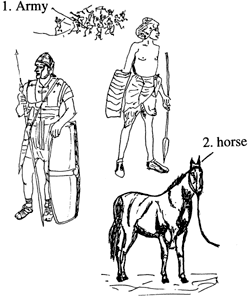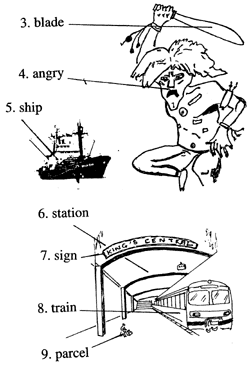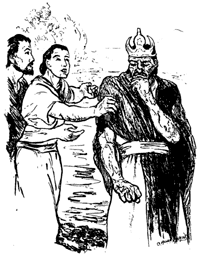Unit 16: Endings In - “ing”
De los conclusiones ing adentro “-”
Pictured Words
Palabras Representadas
New Words
Nuevas Palabras

| 1. army
ejército |
| 2. horse
caballo |
| 3. blade
lámina |
| 4. angry
enojado |

| 5. ship
nave |
| 6. station
estación |
| 7. sign
muestra |
| 8. train
tren |
| 9. parcel
paquete |
Nouns
Sustantivos
cantidad
jefe
oro
propósito
arco
paño
caballo
plata
ejército
comodidad
idea
tren
bolso
actual
viaje
colada
venda
deuda
letra
onda
cambio
deseo
orden
Adjectives
Adjetivos
enojado
enfermo - bien
militar
hermoso
material
probable
Sayings
Refranes
(now mainly about new words and rules).
(ahora principalmente sobre nuevas palabras y reglas).
A horse has high value.
Un caballo tiene alto valor.
Gold must be given in payment for it.
El oro se debe dar en el pago para él.
There are all sorts of army men.
Hay todas las clases de hombres del ejército.
do not get angry, do not get into a fight.
no consiga enojado, no consiguen en una lucha.
My friend is missing.
Mi amigo falta.
Has he been killed?
¿Lo han matado?
It is a good idea to take a journey in a train.
Es una buena idea tomar un viaje en un tren.
Trains give good comfort now.
Los trenes ahora dan buena comodidad.
Endings In -"ing"
Conclusiones En -"ing"
Many words end in -ing.
De muchas palabras del extremo ing adentro -.
In this story we have the examples:
En esta historia tenemos los ejemplos:
In the coming year you will have a son in your arms.
En el año que viene usted tendrá un hijo en sus brazos.
shutting the door on him
cerrar la puerta en él
shutting the door on the two of them
cerrar la puerta en los dos de ellos
Stretching himself out on the child seven times.
Estirándose hacia fuera en el niño siete veces.
Words ending in -ing may be both nouns and adjectives.
Palabras que terminan adentro - el ing puede ser sustantivos y adjetivos.
They help to complete the actions of our 16 verbs.
Ayudan a terminar las acciones de nuestros 16 verbos.
Where wider English uses many verbs, the same range of things may be said by adding -ing to the noun or adjective that relates to the action.
Donde el inglés utiliza más de par en par muchos verbos, la misma gama de cosas puede ser dicha agregando - ing al sustantivo o al adjetivo que se relaciona con la acción.
There may be many nouns ending in -ing, such as hearing, learning, teaching, reading, writing, feeling and others:
Puede haber muchos sustantivos que terminan adentro - el ing, tal como audiencia, aprender, enseñanza, lectura, escribir, sensación y otras:
Give ear to the teaching of a father.
Dé el oído a la enseñanza de un padre.
His blessing is on the tent of the upright.
Su bendición está en la tienda del montante.
in running you will not have a fall.
en el funcionamiento usted no tendrá una caída.
go without waiting
vaya sin esperar
There are also six adjectives with which the ending -ing may be used.
Hay también seis adjetivos con los cuales el conclusión - el ing puede ser utilizado.
They are: clean, cut, dry, open, separate, and shut.
Son: limpio, corte, seco, abierto, separado, y cerrado.
There are also the adjectives: boiling, hanging, pleasing and waiting.
Hay también los adjetivos: el hervir, el colgar, el satisfacer y el esperar.
with a designing heart
con un corazón que diseña
Shame is like a wasting disease in his bones.
La vergüenza es como una enfermedad que pierde en sus huesos.
your vessels overflowing with new wine
sus recipientes que desbordan con el vino nuevo
sweeter than the dropping honey
más dulce que la miel que cae
Let the words of my mouth be pleasing in your eyes.
Deje las palabras de mi boca ser agradables en sus ojos.
Very often the ending in -ing may become an ending in -er:
Muy a menudo el conclusión adentro - el ing puede convertirse en un conclusión adentro – er:
so is the hater of work to those who send him
está tan el hater del trabajo a los que lo envíen
A wise son is a lover of teaching .
Un hijo sabio es un amante de la enseñanza.
take them away with the workers of evil
elimínelos con los trabajadores del mal
more than the watchers for the morning
más que los vigilantes para la mañana
The Lord is your keeper.
El señor es su encargado.
Words ending in -ing may also be used like adjectives after some form of the verb to be.
Palabras que terminan adentro - el ing se puede también utilizar como adjetivos después de una cierta forma del verbo para ser.
They are:
Son:
being, coming, doing, getting, giving, going, having, keeping, letting, making, putting, seeing, seeming, taking.
siendo, viniendo, haciendo, consiguiendo, dando, yendo, teniendo, guardando, dejando, haciendo, poniendo, viendo, el parecerse, tomando.
These -ing forms may be followed by whatever may be necessary to complete the statement :
Éstos - las formas del ing pueden ser seguidas por lo que puede ser necesario terminar la declaración:
keeping my eyes from weeping
guardar mis ojos de llorar
Blessing will be on her food.
La bendición estará en su alimento.
coming down to the edge of his robe
el venir abajo al borde de su traje
lifting up your hands
elevación encima de sus manos
hanging up our instruments of music
el colgar encima de nuestros instrumentos de la música

Why Be Washed Here?
¿Por qué Lávese Aquí?
Now Naaman, chief of the army of the king of Syria, was a man of high position with his master, and greatly respected, because by him the Lord had given salvation to Syria;
Ahora Naaman, jefe del ejército del rey de Siria, era un hombre de la alta posición con su amo, y respetado grandemente, porque por él el señor había dado la salvación a Siria;
but he was a leper.
pero él era un leper.
Now the Syrians had gone out in bands, and taken prisoner from Israel a little girl, who became servant to Naaman's wife.
Ahora los sirios habían salido en vendas, y preso tomado de Israel una pequeña muchacha, que hizo criado a la esposa de Naaman.
And she said to her master's wife, If only my lord would go to the prophet in Samaria, he would make him well.
Y ella dijo a la esposa de su amo, si solamente mi señor fuera al profeta en Samaria, él lo haría bien.
And someone went and said to his Lord, This is what the girl from the land of Israel says.
Y alguien fue y dijo a su señor, éste es lo que dice la muchacha de la tierra de Israel.
So the king of Syria said, Go then;
El rey de Siria dijo, después va tan;
and I will send a letter to the king of Israel.
y enviaré una letra al rey de Israel.
And he went, taking with him ten talents of silver and six thousand shekels of gold, and ten changes of clothing.
Y él fue, tomando con él diez talentos de la plata y seis mil shekels de oro, y diez cambios de ropa.
And he took the letter to the king of Israel, in which the king of Syria had said, See, I have sent my servant Naaman to you;
Y él llevó la letra el rey de Israel, en quien el rey de Siria había dicho, ve, yo le ha enviado a mi criado Naaman;
to be made well, for he is a leper.
ser hecho bien, porque él es un leper.
But the king of Israel, after reading the letter, was greatly troubled and said, Am I God, to give death and life?
¿Pero preocuparon al rey de Israel, después de leer la letra, grandemente y dicho, soy dios, dar muerte y vida?
why does this man send a leper to me to be made well?
¿por qué este hombre me envía a leper que se hará bien?
is it not clear that he is looking for a cause of war?
¿no está claro que él está buscando una causa de la guerra?
Now Elisha, the man of God, hearing that the king of Israel had done this, sent to the king, saying, Why are you troubled?
¿Ahora Elisha, el hombre del dios, oyendo que el rey de Israel había hecho esto, envió al rey, refrán, por qué usted se preocupa?
send the man to me, so that he may see that there is a prophet in Israel.
envíeme a hombre, de modo que él pueda ver que hay un profeta en Israel.
So Naaman, with all his horses and his carriages, came to the door of Elisha's house.
Tan Naaman, con todos sus caballos y sus carros, vino a la puerta de la casa de Elisha.
And Elisha sent a servant to him, saying, Go to Jordan, and after washing seven times in its waters your flesh will be well again and you will be clean.
Y Elisha le envió a criado, decir, va a Jordania, y después de lavar siete veces en sus aguas su carne estará bien otra vez y usted estará limpio.
But Naaman was angry and went away and said, I had the idea that he would come out to see such an important person as I am, and make prayer to the Lord his God, and with a wave of his hand over the place make the leper
Pero Naaman estaba enojado e iba ausente y dicho, tenía la idea que él saldría ver a una persona importante tal que soy, y hacer rezo al señor a su dios, y con una onda el suyo entregue el lugar hacen el
Are not Abana and Pharpar, rivers of Damascus, better than all the waters of Israel?
¿No son Abana y Pharpar, ríos de Damasco, mejores que todas las aguas de Israel?
may I not be washed in them and become clean?
¿no puedo ser lavado en ellos y llegar a estar limpio?
So turning, he went away in wrath.
Tan dando vuelta, él entró lejos en cólera.
Then his servants came to him and said, If the prophet had given you orders to do some great thing, would you not have done it?
¿Después sus criados vino a él y dijo, si el profeta le hubiera dado órdenes para hacer una cierta gran cosa, usted no la habría hecho?
how much more then, when he says to you, Be washed and become clean?
¿cuánto después, cuando él dice a usted, se lave y se llega a estar limpio?
Then he went down seven times into the waters of Jordan, as the man of God had said;
Entonces él fue abajo de siete veces en las aguas de Jordania, como el hombre del dios había dicho;
and his flesh became like the flesh of a little child again, and he was clean.
y su carne se convirtió como la carne de un pequeño niño otra vez, y él estaba limpio.
Additional Reading
Lectura Adicional
The land where Naaman had his house is a long way from Israel.
La tierra en donde Naaman tenía su casa está lejos de Israel.
So, the journey he took was a very hard one.
Así pues, el viaje que él tomó era muy difícilmente el.
He had an army of helpers to give him comfort along the way and to take care of his goods.
Él tenía un ejército de los ayudantes para darle comodidad a lo largo de la manera y para tomar el cuidado de sus mercancías.
Why did he make this long, hard journey?
¿Por qué él hizo este viaje largo, duro?
It was because he had the bad disease we give the name of leprosy to.
Era porque él tenía la mala enfermedad que damos el nombre de la lepra a.
If you got leprosy you had to go away from others and live alone, probably in waste lands.
Si usted consiguió la lepra que usted tuvo que ir lejos de otros y vivir solamente, probablemente en los eriales.
It was as bad as all that.
Era tan malo como todo el eso.
Naaman was fearful of that becoming his way of living.
Naaman era temeroso de ese convertirse en su manera de vivir.
How did Naaman get the news of a prophet in Israel?
¿Cómo Naaman consiguió las noticias de un profeta en Israel?
A little girl told him.
Una pequeña muchacha le dijo.
We do not even have her name.
Incluso no tenemos su nombre.
The only knowledge we have of her is that she had lived in the beautiful high country of Israel when she was a little girl.
El único conocimiento que tenemos de ella es que ella había vivido en el país alto hermoso de Israel cuando ella era una pequeña muchacha.
And she had been made a servant to Naaman's wife by those who took her from her land.
Y las le había hecho un criado a la esposa de Naaman que la tomaron de su tierra.
But, she had become a friend to Naaman's wife and was so kind a little girl as to have had thought for Naaman.
Pero, ella había hecho un amigo a la esposa de Naaman y era tan buena una pequeña muchacha en cuanto a ha tenido pensamiento para Naaman.
That is why he made that long journey.
Ése es porqué él hizo ese viaje largo.
He was very conscious of the need to get rid of his leprosy.
Él era muy consciente de la necesidad de conseguir librado de su lepra.
Now, when Naaman got to the prophet in Israel, he was troubled.
Ahora, cuando Naaman consiguió al profeta en Israel, lo preocuparon.
The prophet did not come outside of his house to see him.
El profeta no vino fuera de su casa verlo.
No one had ever shown so little respect for him before.
Nadie habían demostrado siempre tan poco el respecto por él antes.
That is why he did not go quickly and take a bath in the slow running current of water in the Jordan river.
Ése es porqué él no fue rápidamente y no tomó un baño en la corriente corriente lenta del agua en el río de Jordania.
He had too high an opinion of himself.
Él tenía una opinión demasiado alta de se.
It was necessary for Naaman to get a smaller measure of his own importance.
Era necesario que Naaman consiga una medida más pequeña de su propia importancia.
He had two things wrong with him: leprosy and self importance.
Él tenía dos cosas mal con él: importancia de la lepra y del uno mismo.
The prophet had help for both.
El profeta tenía ayuda para ambos.
When Naaman was well again, he was very conscious of his great debt to the prophet.
Cuando Naaman estaba bien otra vez, él era muy consciente de su gran deuda al profeta.
But it was God who had made him well.
Pero era el dios que lo había hecho bien.
So, Naaman asked for two bags of earth to take back to his own country with him.
Así pues, Naaman pidió dos bolsos de tierra tomar de nuevo a su propio país con él.
It was a common belief in those times that a God lived in the earth of the country.
Era una creencia común en esas épocas que un dios vivió en la tierra del país.
So, Naaman would have to make his offerings to the God of Israel when he was kneeling on that country's earth.
Así pues, Naaman tendría que hacer sus ofrendas al dios de Israel cuando él se arrodillaba en la tierra de ese país.
We now hold the view that the reason for a belief like that was a quite sensible one.
Ahora llevamos a cabo la visión que la razón de una creencia tiene gusto que era absolutamente sensible.
In the Mediterranean countries the soil of some fields grew better plants than others.
En los países mediterráneos el suelo de algunos campos creció plantas mejores que otras.
There were organisms in them that made them good for plants.
Había organismos en ellas que les hicieron el bueno para las plantas.
This seemed to say to them that a god lived in those soils.
Esto se parecía decir a ellas que un dios vivió en esos suelos.
And, so it was right to make offerings to that god, if you might get the earth on which to do it.
Y, así que él correcto hacer ofrendas a ese dios, si usted puede ser que consiga la tierra en la cual hacerla.
It was a widely held belief that offerings should be made to that god.
Era una creencia extensamente llevada a cabo que las ofrendas se deben hacer a ese dios.
Helpful Notes
Notas Provechosas
| leprosy
lepra | a greatly feared disease.
una enfermedad grandemente temida. |
| talents
talentos | a money measure.
una medida de dinero. |
| shekels
shekels | a money measure.
una medida de dinero. |
| prophet
profeta | a man of god.
un hombre del dios. |
| make prayer
haga el rezo | be crying to God for help.
está gritando al dios para la ayuda. |
| waste lands
eriales | hard places for living.
lugares duros para vivir. |
| offerings
ofrendas | something offered to the gods.
algo ofreció a los dioses. |
| organisms
organismos | small living things.
cosas vivas pequeñas. |
| salvation
salvación | the act of being made safe.
el acto de la fabricación seguro. |
| Syrians
Sirios | a war-like group of those times.
una guerra tiene gusto del grupo de esas épocas. |